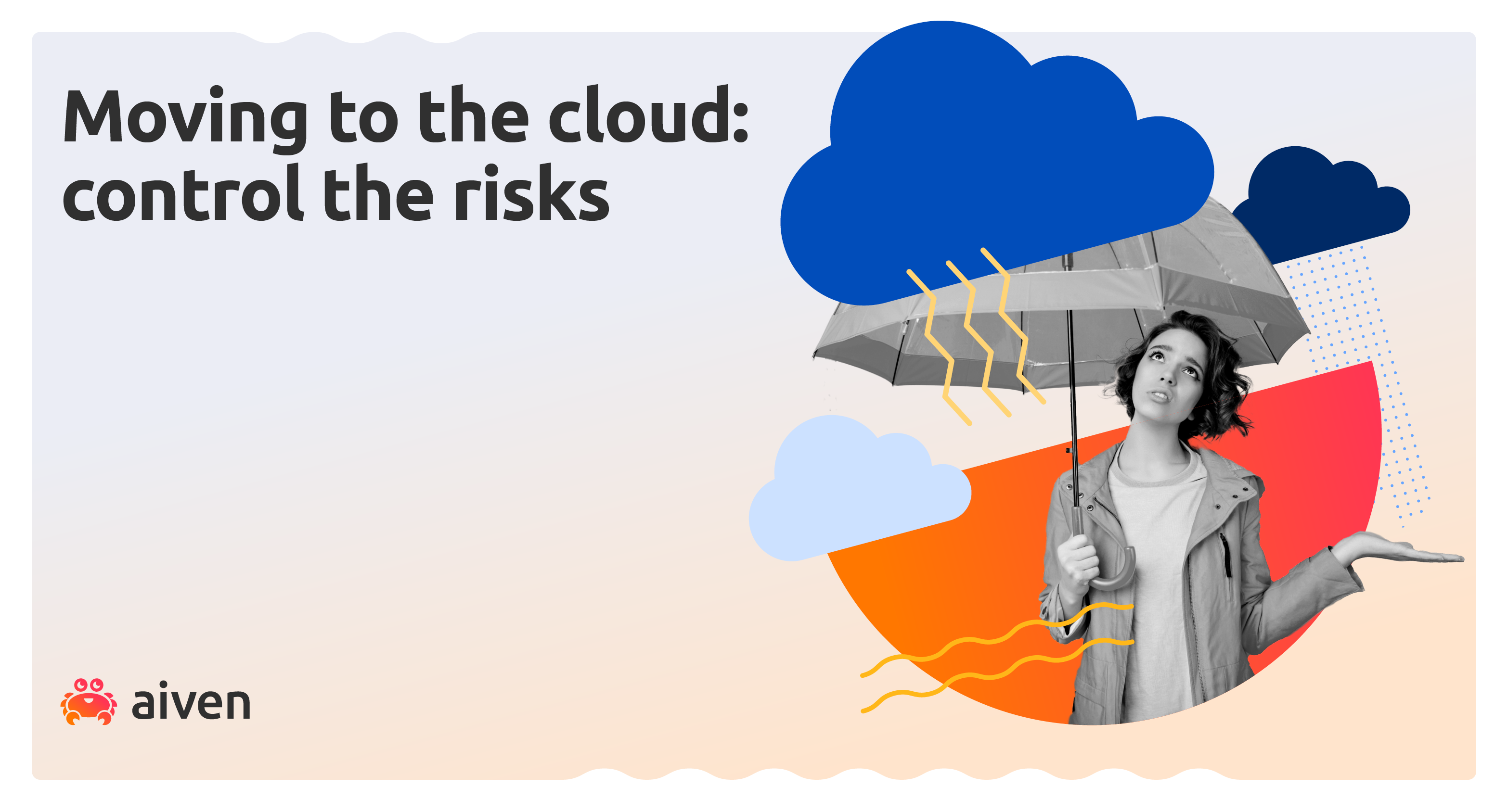Nov 12, 2021
Why DBAs embrace managed services
Some DBAs object to moving from on-prem (or self-hosted) to managed services. We hear you, but read this post to find out our side of the issue.
Auri Poso
|RSS FeedTechnical Copywriter at Aiven
A lot of DBAs these days are starting to warm up to the idea of using managed database services, with good reason. But many are still resisting. Why is that?
In this piece, we’ll address the objections that DBAs and others have with managed services, and then look at some of the real benefits of managed database services.
What even are managed services? What is DBaaS?
In a managed service, processes and functions are packaged together and sold to customers to improve and simplify operations as well as slash expenses. Managed services involve a relationship between a service provider who builds and maintains the services as well as a subscriber or customer who buys those services. These two parties are bound by a contract known as a service-level agreement (SLA), which outlines the agreed performance, latency and other quality requirements of the service.
A database as a service (DBaaS) is a refinement of that concept which focuses on databases. DBaaS allows the subscriber to outsource the hosting and management of the database.
We won't take your job!
What happens to DevOps, Data Engineers and DBAs when managed services are adopted to replace on-prem or self-managed cloud services?
In general, there will certainly be less need for on-premise data pipeline engineers in the future. In the open-source (and software) world, one of the main aims is to build up and share foundations upon which future innovation can take root. A natural consequence is that there will be a lot less reinventing the wheel and building up the same thing all over again from scratch.
Even today it’s a challenge to put together a talented team of any kind in the IT sector, DevOps included. And many experts shun repetitive work, regardless of whether their title contains the word ‘maintenance’ or ‘development’. Managed solutions help your company to manage with fewer staff. If you’re a developer, data scientist or, yes, a DBA, in a managed infrastructure setup you can work with tasks that you find meaningful.
Imagine a world where you could dedicate your time and effort almost exclusively on these:
- getting real insights and analytics from ALL the data
- discovering new things to do with data
- providing data engineering support (focusing on on data analytics)
- data science
- modelling and testing data models
- data visualization
- building and training AI and ML
- building business end applications?
You will still control your system!
Taking managed cloud solutions into use means in-house staff will have less control over the minutiae of database setup and management. In practical terms, this means less sharding and replication, less hardware configuration, less setting up, fewer updates, less reliability engineering, less latency tweaking, and less throughput engineering.
Okay, some techies do like doing all that, and the rest of the techies love them for it. But are there enough of them to keep all of your infra running? (See previous point about jobs.) Chances are, at least some of those crucial concerns are being dealt with by people who are not interested and whose core competencies lie elsewhere. That’s where the risks come in: misconfigurations, less than optimal optimizations, infra tweaks that break the build.
With a managed cloud solution, all risare partly eliminated as the experts minding the infra are experts at minding the infra. And the rest of the risk is externalised: if the hosting company fouls up, they pay for it, not you.
And Aiven’s DBaaS and hosted Kafka are ISO 27001-2013 and SOC2 compliant, so you know exactly where you stand with industry standard compliance and trust.
It doesn’t cost too much!
Does it really cost too much to buy your database as a service?
For an on-prem service, you need, well, premises. Then there’s the hardware outlay, electricity, security, building maintenance, insurance, connectivity.... And it goes on from there. All these things cost money.
Regular tasks related to database management include monitoring, regular upgrades, configuration tuning, updates, extension management, tracking software updates, data migration between versions, test suites, ops on-call duties, certification management, and network encryption. As noted above, you need a team for that, and they certainly don’t work for free. They’re providing the same service as a DBaaS provider’s team, but only for your company, so you’re paying all the staff costs.
Besides, when you buy your own infra, you have to buy enough capacity to handle peak load times. But not all times are peak load times (duh, that’s the point) and during quiet periods, that extra infra is just sitting there, costing money.
With a managed solution, you only have to take care of the stuff with the white background. The grey background ones are our headache.
To bring the discussion down to earth, have a look at Aiven’s pricing page, and then at what your company is (or would be) paying for an on-prem solution.
Still having questions?
In addition to allowing you and your team to focus on your core business, Aiven gives you technical support 24-7. We’re happy to answer any questions and address any issues that arise in conjunction with our services!
Wrapping up
For DBAs who like to develop their skills and focus on what really matters to the company, the best thing that can happen is moving to a managed service at Aiven(*).
For the bosses of DBAs and their companies, the best thing that can happen is also moving to a managed service at Aiven.
Talk about win-win!
--
(*)
And if it so happens that you’re like us and love maintaining that routine and putting out fires, come work at Aiven ;)
Not using Aiven services yet? Sign up now for your free trial at https://console.aiven.io/signup!
In the meantime, make sure you follow our changelog and blog RSS feeds or our LinkedIn and Twitter accounts to stay up-to-date with product and feature-related news.
Stay updated with Aiven
Subscribe for the latest news and insights on open source, Aiven offerings, and more.




